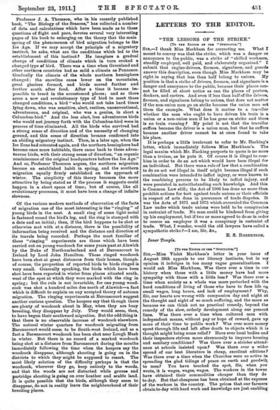LETTERS TO THE EDITOR.
" THE LESSONS OF THE STRIKE."
[To TEM EDITOR OP TEM "SPECTATOR."] SIR, —I thank Miss Markham for correcting me. What I meant to convey was that the strike, which was a danger or annoyance to the public, was a strike of " skilled workmen, steadily employed, well paid, and elaborately organized." I submit that engine-drivers, firemen, signalmen, and guards answer this description, even though Miss Markham may be right in saying that less than half belong to unions. My position is that a strike of drivers, firemen, and signalmen is a danger and annoyance to the public, because their places can- not be filled at short notice as can the places of porters, dockers, and carters. And even if less than half of the drivers, firemen, and signalmen belong to unions, that does not matter if the non-union men go on strike because the union men set them the example. What does it matter to a traveller whether the man who ought to have driven his train is a union or a non-union man if he has gone on strike and there is no train running P My point is not that the traveller suffers because the driver is a union man, but that he suffers because another driver cannot be at once found to take his place.
It is perhaps a little irrelevant to refer to Mr. Hacking's
letter, which immediately follows Miss Markham's. The legal maxim which Mr. Hacking purports to quote is no more than a truism, as he puts it. Of course it is illegal to com- bine in order to do an act which would have been illegal for an individual. But there was a rule of law that a combination to do an act not illegal in itself might become illegal if such combination were intended to inflict injury, or were known to the combining persons to be likely to inflict injury, and were persisted in notwithstanding such knowledge. And this is Common Law still; the Act of 1906 has done no more than prohibit actions for tort against trade unions or their officials in respect of acts done in pursuance of trade disputes. It was the Acts of 1871 and 1875 which overruled the Common Law under which trade unions were held to be conspiracies in restraint of trade. No man could be hindered from giving up his employment, but if two or more agreed to do so in order to coerce an employer it was a conspiracy in restraint of trade. What, I wonder, would the old lawyers have called a sympathetic strike P—I am, Sir, &c.,
Inner Temple. E. S. ROBERTSON.






































 Previous page
Previous page